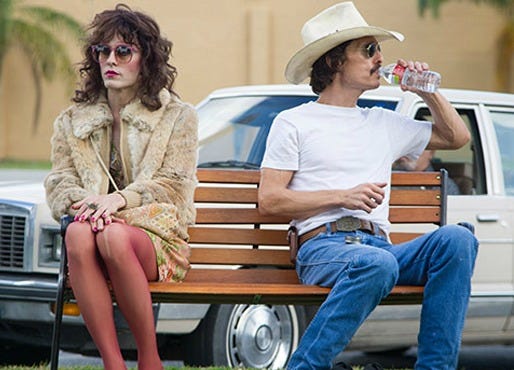Dallas Buyers Club

Ron Woodruff doesn’t look like a hero. He doesn’t sound like one, either, and, in fact, does a whole lot of irresponsible and even hateful stuff. When we first meet him, it’s apparent he’s particularly not fond of gay people, using the other F-word freely — though this wasn’t really unusual in Texas in 1985, when the AIDS epidemic had finally rolled out into mainstream consciousness.
Yet Ron, for all his many, many faults, did something that was downright heroic. He smuggled in drugs for HIV-positive patients that had not yet been approved by the FDA, saving countless lives. He did it to save his own skin and make money, so it’s not unfair to call him a drug smuggler — of non-legalized (as opposed to illegal) pharmaceuticals.
The movie about his story, “Dallas Buyers Club,” is easily one of the best of the year, a touching story that never slides into self-indulgence and pap.
But let’s get back to how Ron looks because it’s a sight. And that means talking about the appearance of Matthew McConaughey, who portrays Ron. The actor, whom it would be fair to say glided for years on his good looks, has lost so much weight he’s beyond thin. He’s downright frightening to look at.
All of McConaughey’s movie-star vanity is gone here. His face has caved in, those prominent cheekbones standing out like a pair of lonely buttes on the wide Texas plains. The rippling arms and legs have become withered twigs, the sculpted abs fallen in on themselves. He makes the scrawny guy in those old Charles Atlas muscle ads seem well-fed.
“As wiry as an ocotillo,” a reporter once described Ron, referring to the scraggly desert plant. That’s about right. He walks around with a foot of extra belt hanging off his jeans from being cinched ever further.
Ron, though, thinks he’s indestructible. The first image director Jean-Marc Vallée shows us is Ron, an itinerant bullrider, having sex with two women in the cages next to the rodeo while another rider is horribly mangled. He also drinks, does a lot of drugs and is basically a disaster waiting to happen.
When he’s injured on the job as an electrician, Ron can’t believe it when the doctors tell him he’s tested HIV-positive. Not even when they tell him his T-cell count, normally between 500 and 1,500, is seven.
“Frankly, we’re surprised you’re even alive,” the doc says.
Given 30 days to live, Ron goes through the stages of grief at lightspeed. Rejected by his roughneck buddies, who cannot gather how anyone but a homosexual could contract the disease, he tries to get into a drug trial for AZT. A compassionate doctor (Jennifer Garner) tries unsuccessfully to help him, but he scores some through the black market, though the drug only seems to make him weaker.
Arriving on the doorstep of a quack former doctor in Mexico (Griffin Dunne), Ron learns that there are other drugs available to effectively treat symptoms of HIV/AIDS, but they just haven’t been approved by the FDA. After recovering with the help of this medicine, he makes it his mission to smuggle these into America and make a killing off keeping others alive.
Since his market is (at this stage of the disease) almost entirely gay men, Ron finds that a homophobic, foul-mouthed cowboy like himself has troubles making inroads to this clientele. So he enlists the aid of Rayon, a transvestite prostitute played by Jared Leto.
Leto and McConaughey both deserve Oscar nominations for their performances, especially after witnessing the slow dance toward trust and understanding their two characters undertake. Leto, starved almost to the same proportions as McConaughey, is like a warped latter-day version of Norma Desmond, the fallen star from “Sunset Boulevard.” Rayon desperately clings to the belief she deserves better than what she’s gotten out of life, both her body and her circumstance, and it gives her a sort of vainglorious grace.
Eventually the feds arrive to shut down the party, as they did with dozens of other “buyers clubs” that sprung up around the country in the mid-1980s to sell non-approved HIV medicine. (The scam to get around FDA rules was that the drugs were free, as long as you buy a “membership” in the club.) The movie bogs down a little here, as screenwriters Craig Borten and Melisa Wallack focus too much on the legal shenanigans.
Mostly, “Dallas Buyers Club” is a showcase for the long-dormant talents of Matthew McConaughey, who broke onto the Hollywood scene as “the next Paul Newman” then lost his way with conceited roles in movies dreamed up by accountants rather than artists. Based on this extraordinary film and “Mud,” he’s ready to shoulder that heavy mantle again.
4.5 Yaps



